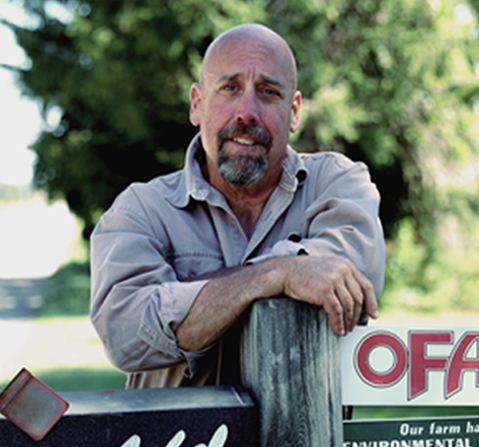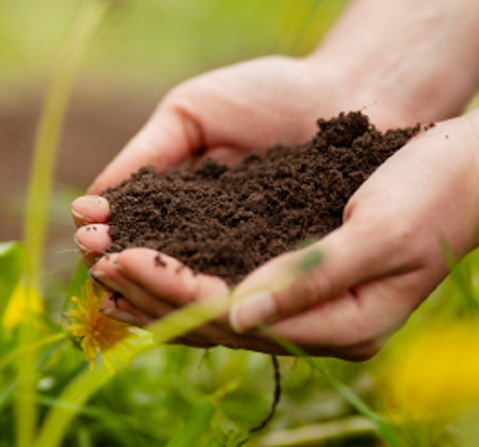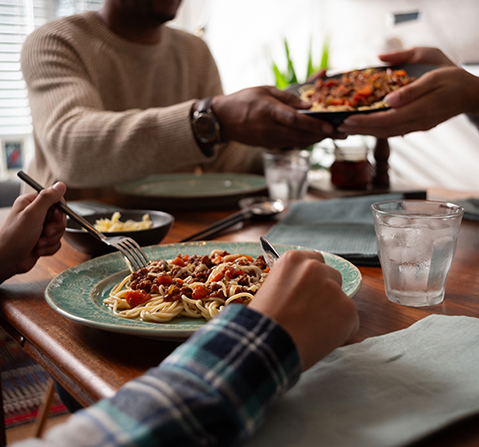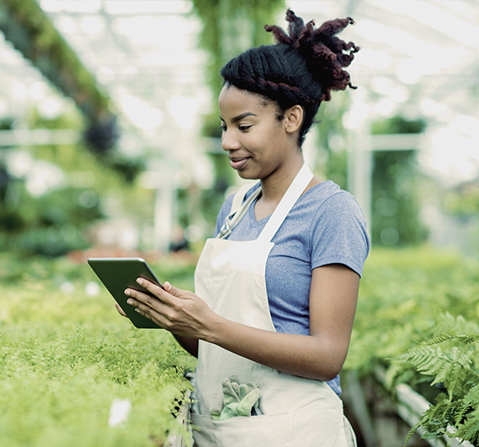Wine producers, Kalala Organic Estate Winery, Kelowna, British Columbia.
Discover why Karnail and his family work for a sustainable future
Transcript
We are operating about 70 acres of land, majority of this is vineyard, but we do also grow organic apples which we sell to fresh market and we use for our juice. We are, I think one of the very first wineries in Westbank to be organic. And other uniqueness is, I think there's only one person who works here whose first language is English. We have employees from all different corners of the world. It's very satisfying work, farming for me, because then you've produced something to serve the community. So it's very satisfying when I produce a product and to go to the people, they can consume it. Oh, I wake up very proudly because I feel proud of what I'm doing and I feel proud of what we established. I feel proud of my family, what we did. And I wake up happy to go to work. I would personally say I really don't feel there is any challenge. Mainly, it's your mindset. I think it comes from Native people. "The land... ...is the gift for the future generations." That really inspires me.
[Upbeat music begins]
[A montage of images shows the harvest and pressing of grapes for wine. It ends with an image of a single cluster of yellow grapes hanging off a branch with the sun shining behind.]
[Images move quickly, the screen divides into nine with images of the vineyard, grapes, bottles of wine, workers tending the vines and operating the equipment, ending with full screen of green grapes.]
Text on screen: Meet the people behind your food
[Karnail Singh Sidhu stands in front of a steel fermentation tank, laughing.]
Text on screen: Karnail Singh Sidhu – Wine Producer, West Kelowna, British Columbia
Karnail Sidhu: We are operating about 70 acres of land, majority of this is vineyard…
[An aerial view of West Kelowna and the rows of vines.]
...but we do also grow organic apples which we sell to fresh market, and we use for our juice.
[An overhead view as employees harvests grapes, a close-up as an employee puts a net over the crops, cuts a cluster of grapes off a vine, and pours clusters of grapes from a bucket into a big container.]
Text on screen: What makes your operation unique?
[A close-up view of an employee holding a cluster of grapes in their hands, with a bin of grapes directly underneath their hands.]
We are, I think, one of the very first wineries in Westbank to be organic.
[An employee leans over and moves around the clusters of grapes within the large bin and a close-up view of the grapes.]
And other uniqueness is...
[An employee drives a small forklift carrying a large stack of white bins and places them down on the ground.]
...I think there's only one person who works here whose first language is English.
[A close-up view of Karnail.]
We have employees from all different corners of the world.
[A montage of employees at the Kalala winery -- in the fields and in the offices.]
Text on screen: What do you like about your work?
[Karnail walks down a row of vines, eats a grape. An employee drives a tractor away with a bin of grapes on the back and Karnail drives a tractor.]
It's very satisfying work, farming for me, because then you've produced something to serve the community.
[An employee guides the tractor as it drops a load of grapes into a machine, a close-up view of grapes falling into a container as it's being mixed by a machine. Karnail fills up a cylinder with red wine from the steel fermentation tank.]
So it's very satisfying when I produce a product and to go to the people, they can consume it.
[Karnail smiles and pours red wine into a wine glass at a bar for a customer and a close-up view of the customer swirling the glass of red wine.]
Text on screen: How do you start your day?
[Karnail uses a long brush to clean some equipment and stands over a fermentation tank.]
Oh, I wake up very proudly because I feel proud of what I'm doing and I feel proud of what we established. I feel proud of my family, what we did.
[Karnail outside on the tractor. Inside the fermentation room, he checks the hydrometer in a graduated cylinder filled with red wine, he stands outside smiling beside his wife and daughter. Karnail in front of the steel fermenter.]
And I wake up happy to go to work.
Text on screen: What are the challenges of organic farming?
[Karnail holds a graduated cylinder filled with liquid and smells it, checks the gauge of one of the fermenters and Karnail stands in front of the fermenter, gives two thumbs up.]
I would personally say I really don't feel there is any challenge. Mainly, it's your mindset.
Text on screen: What inspires you most?
[The company's logo on the wall, which says in gold writing "KALALA Organic Estate Winery".]
I think it comes from Native people.
[A bird's-eye view of the rows of vines with a tractor between the rows with employees trailing behind to harvest.]
"The land is the gift for the future generations."
[Karnail talks to the camera.]
That really inspires me.
[Cut to a close-up of multiple wine bottles in a row, each with a medal around the bottle.]
Text on screen: Canadian farmers and agricultural businesses work to feed you and future generations. Discover how they are growing a better future. Canada.ca/Taste-the-Commitment
[Karnail smiles and holds a grape up to the camera with the crop fields in the background.]
Text on screen: Agriculture and Agri-Food Canada – Agriculture et Agroalimentaire Canada
[Government of Canada wordmark.]
[Upbeat music ends.]
[End.]
Learn how Karnail and his family put sustainability into practice
Transcript
I look what's important in the future. Do we want to deplete our soil so our future generations will starve? Or do we want to keep our soil in better than what we got so they will flourish? I have one thing I always tell: the organic farms do not look like a golf course. You still can see there's a fair amount of other plants growing in vineyards. And those plants do host some beneficial fungus and do host some beneficial insects. And they will help us to keep the equilibrium in the vineyard or in the farm. We call it culture practice to control insect and disease. And the main insect in a vineyard is a leaf hopper. What happens when we we're going, we're hitting 20 degrees or something, they start laying their eggs down on the first four or five leaves on the grapevine. And when I see, the eggs are almost ready to hatch, we send the people in the vineyard. I say: clean that area, just those four, five leaves. Pluck them and throw them on the ground. And they're not getting moisture anymore. The eggs are not fertile anymore. We did work with the Summerland Research Centre to quantify it did work. We calculate, I think at that time, 72% of the population is controlled by doing that. And another benefit of doing that, it also controls fungus in the grapes because they're exposed to sun. If we don't do it, we don't learn. And I don't like to say no to anything, because I believe when you say no, you fail without trying. Wine-making is 90% done in the vineyard, which I feel like, myself, I'm very good at growing grapes. The future is very bright because 27 years ago, when I started in the industry, you talked about organic to people immediately, the image is you're a hippy. But that image is changing. And more mainstream people are going into organic. And we have a lot more knowledge available on how to do organic. And we have people who are looking for organic and new generation is more educated. I think the future is very bright. And it will grow. I think in here, if I speak about the wine industry in the next 5 to 10 years, we probably have more than 50% people growing organic. Because I see that change.
[Upbeat music begins]
[An aerial view of West Kelowna and of the rows of grapevines at Kalala Organic Winery. An overhead view as workers harvest grapes and a a small tractor drives away with a bin of grapes on the back.]
Karnail Singh Sidhu: I look what's important in the future.
[Karnail stands in front of a steel fermentation tank and talks to the camera.]
Text on screen: Karnail Singh Sidhu – Wine Producer, West Kelowna, British Columbia
Do we want to deplete our soil so our future generations will starve? Or do we want to keep our soil in better than what we got so they will flourish?
Text on screen: Sustainable Agriculture in Action
[An animation of a fork and shovel appear on either side of the title. A close-up view of a cluster of green grapes on a vine.]
Text on screen: What is different about organic vineyards?
I have one thing I always tell:
[An aerial view as workers harvest grapes.]
...the organic farms do not look like a golf course. You still can see there's a fair amount of…
[A tractor moves slowly beside a row of vines as workers walk behind and harvest grapes.]
…other plants growing in vineyards.
[A worker walks down a row of vines.]
And those plants do host some beneficial fungus and do host some beneficial insects.
[An employee drives a tractor between rows with a bin of green grapes on the back.]
And they will help us to…
[Karnail inspects a row of vines.]
…keep the equilibrium in the vineyard or in the farm.
Text on screen: How do you control pests and disease?
We call it culture practice to control insect and disease. And the main insect in a vineyard is…
[A close-up view of clusters of green grapes.]
…a leaf hopper.
[A close-up view of a leaf hopper on a partially eaten vine leaf then flies off.]
What happens when we we're going, we're hitting 20 degrees or something, they…
[A close-up view of yellow vine leaves.]
…start laying their eggs down on the first four or five leaves on the grapevine.
[Karnail inspects a row of vines, and a close-up of rows vines in the field with houses and hills in the background.]
And when I see the eggs are almost ready to hatch, we send the people in the vineyard.
I say:
[A close-up view of hands holding shears, pruning leaves off the vines.]
...clean that area, just those four, five leaves. Pluck them and throw them on the ground. And they're not getting moisture anymore.
[A close-up view of pruned leaves and vines falling to the ground.]
The eggs are not fertile anymore.
[An aerial view of the Summerland Research and Development Centre with lake and mountains in the background.]
We did work with the Summerland Research Centre to quantify it did work.
[A view of the vineyard with mountains and a lake in the background.]
We calculate, I think at that time, 72% of the population is controlled by doing that. And another benefit of doing that, it also controls fungus in the grapes because they're exposed to sun.
Text on screen: What motivates you to experiment?
If we don't do it, we don't learn. And I don't like to say no to anything…
[Inside the fermentation room, Karnail climbs down a ladder on a fermentation tank, a graduated cylinder in his hand.]
…because I believe when you say no, you fail without trying.
[Karnail stands in front of the fermenter, gives two thumbs up.]
Text on screen: What's your secret?
[A worker adjusts a net over the crops, workers cut clusters of grapes off a vine, and pours clusters of grapes from a bucket into a big container.]
Wine-making is 90% done in the vineyard, which I feel like, myself, I'm very good at growing grapes.
Text on screen: How do you see the future of organic farming?
The future is very bright…
[A close-up view of an employee holding clusters of green grapes as they fall into a large bin, then leans over and spreads the clusters of grapes in the large bin.]
…because 27 years ago, when I started in the industry…
[Karnail walks down a row of vines, he eats a grape.]
…you talked about organic to people immediately, the image is you're a hippy.
[Karnail smiles and holds a cluster of purple grapes up to the camera with the crop fields in the background. A close-up view of clusters of green grapes.]
But that image is changing.
[Karnail drives a small forklift carrying large white bins.]
And more mainstream people are going into organic.
[A worker guides the tractor as it drops a load of grapes into a machine, a close-up view of grapes falling into the industrial grape press. Karnail fills up a cylinder with red wine from the steel fermentation tank.]
And we have a lot more knowledge available on how to do organic.
[Karnail checks the hydrometer in a graduated cylinder filled with red wine, he smiles and pours red wine into a wine glass at a bar for a customer and a close-up view of the customer swirling the glass of red wine.]
And we have people who are looking for organic and new generation is more educated.
[A worker drives a forklift, carrying large white stacked bins, workers shovel stems off the ground beside the destemmer and workers in an office.]
I think the future is very bright. And it will grow.
[A close-up of Karnail with the sun shining behind him. Inside, he stands in front of the fermentation tanks and speaks to the camera.]
I think in here, if I speak about the wine industry in the next 5 to 10 years, we probably have more than 50% people growing organic. Because I see that change.
[Cut to a close-up of five wine bottles in a row, each with a ribbon and medal around each bottle.]
Text on screen: Canadian farmers and agricultural businesses work to feed you and future generations. Discover how they are growing a better future. Canada.ca/Taste-the-Commitment
[Karnail smiles and holds a grape up to the camera with the vineyard in the background.]
[Upbeat music ends]
Text on screen: Agriculture and Agri-Food Canada – Agriculture et Agroalimentaire Canada
[AAFC signature and Government of Canada wordmark]
[End].







